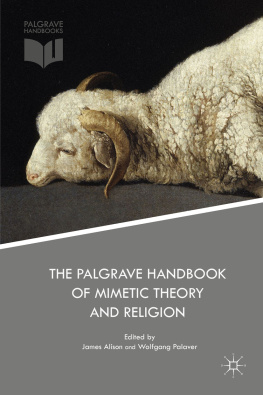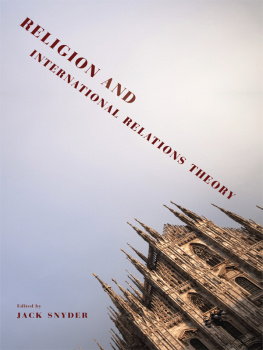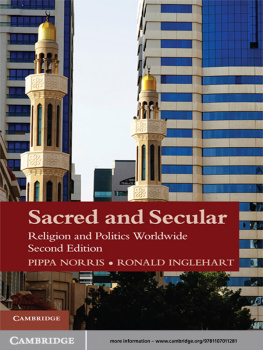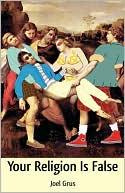Stanford University Press
Stanford, California
English translation 2013 by the Board of Trustees of the Leland Stanford Junior University. All rights reserved.
A Systems Theory of Religion was originally published in German under the title Die Religion der Gesellschaft. Suhrkamp Verlag Frankfurt am Main 2000.
The translation of this work was funded by Geisteswissenschaften International-Translation Funding for Humanities and Social Sciences from Germany, a joint initiative of the Fritz Thyssen Foundation, the German Federal Foreign Office, the collecting society VG WORT and the German Publishers & Booksellers Association.
No part of this book may be reproduced or transmitted in any form or by any means, electronic or mechanical, including photocopying and recording, or in any information storage or retrieval system without the prior written permission of Stanford University Press.
Printed in the United States of America on acid-free, archival-quality paper
Library of Congress Cataloging-in-Publication Data
Luhmann, Niklas, 1927-1998, author.
[Religion der Gesellschaft. English]
A systems theory of religion / Niklas Luhmann ; Edited by Andr Kieserling ; Translated by David A. Brenner with Adrian Hermann.
pages cm.--(Cultural memory in the present)
Originally published in German under the title Die Religion der Gesellschaft.
Includes bibliographical references and index.
ISBN 978-0-8047-4328-0 (cloth : alk. paper)--ISBN 978-0-8047-4329-7 (pbk. : alk. paper)
ISBN 978-0-8047-8793-2 (e-book)
1. Religion and sociology. 2. Social systems. 3. System theory. I. Kieserling, Andr, editor. II. Title. III. Series: Cultural memory in the present.
BL60.L83513 2013
306.6--dc23 2012031152
Typeset by Bruce Lundquist in 11/13.5 Adobe Garamond
A SYSTEMS THEORY OF RELIGION
Niklas Luhmann
Edited by Andr Kieserling
Translated by David A. Brenner
with Adrian Hermann
STANFORD UNIVERSITY PRESS
STANFORD, CALIFORNIA
Cultural Memory in the Present
Mieke Bal and Hent de Vries, Editors
Contents
Editors Note
Niklas Luhmanns work on this book, which he began in the early 1990s, was interrupted by illness and finally by his death. By that point, the forthcoming publication of his social theory already overshadowed all other projects to be published. The time remaining to him did not suffice to put the text presented here into a form that would he would have found compelling. Attached to the manuscript were references to more recent literature he wanted to follow up on, as well as brief notes on additional aspects of the topic, letting us know that the text was supposed to be longer. There is no indication that Luhmann thought the book was in a publishable form as it stood, but what we have here doubtless comes close. The text is much more than a mere fragment, and a bit more time would presumably have sufficed for Luhmann to complete work on it.
The book presented here is based on a computer printout made in February 1997. Luhmann had apparently looked over this copy, and he attached typed additions to it at different points. In editing the text, I have limited myself to integrating these additions into the main manuscript, correcting typographical errors and filling in gaps in the reference material. In addition, I have updated notes in which the author cites himself to make it easier for the reader to find the most current version of his theory. In accordance with Luhmanns usual practice, an index has been supplied.
...
Bernd Stiegler at Suhrkamp Verlag and Veronika Luhmann-Schrder, who owned the rights, cooperated with each other and with the editor in the most productive way imaginable in preparing the manuscript for publication. I hereby express my gratitude to them both.
Andr Kieserling
Munich, May 2000
Religion as a Form of Meaning
I
How does one identify certain social appearances as religion? That is the question one has to start with.
For a person of faith, this question may be meaningless. Such a person can say what he believes and abide by that. He may dispute whether calling it religion benefits him at all. He may even reject the designation, seeing it as classifying phenomena in a way that places him in a category with things he would reject as not worth believing. The idea of religion thus seems to be a cultural one, an idea that calls for a certain tolerance.
However, for those who do not believe what they might like to signify with the term religion, the notion has its problems and limitations. And then there are those who might wish to communicate about religion without having to commit to a faith of their own. And those who wish to problematize the notion, or at least distinguish it from other ideas. Neither ontological nor analytical solutions are of any help these days. In the ontological tradition, no one should have a problem with this, for what that tradition holds to be religion emerges out of the essence of religion. If any mistakes were made, one would merely have to recognize them and clean them upan attitude that itself approximates faith. By contrast, the analytical thinker claims he is free to determine the scope of his own thought. For him, only propositions can be true, not ideas. However, he is confronted with having to limit arbitrariness (a methodological concession), a problem that cannot be resolved (least of all empirically). If the ontologist is too close to religion, the analytic thinker is too far away from it. The worst thing to do would be to look for a (practical) solution somewhere in the middle. These two solutions are unusable by us, leaving us without a principle to convey.
If looking for more concrete answers, one can differentiate between sociological (Emile Durkheim) and phenomenological ones (Rudolf Otto). At present, however, we are not interested in their content but in how they are derived.
Durkheim views religion as a moraland thus a socialfact. Through morality and religion, society makes itself the transcendence that God, whose facticity is now disputed, can no longer offer.
As a moral fact, religion is defined in two ways: by a moment of desire (dsir), which appraises values, and by a moment of sanction that limits what is permitted (sacr). We can see that moralityand along with it, religionemerges in a twofold process of expansion and contraction. It is based on a type of self-dissolution also linked to forms that operate as a unit, as a stabilized tension. These forms command our attention in the face of the unbearable possibility that their unity might again be dissolved into distinction. On this basis as well, religious forms are developed by further distinguishing between sacred and profane. While morality is defined by a distinction in which both sides claim one another, religion is characterized by a relationship of exclusion. In each of these cases, the aim is to understand society as a comprehensive system. This is also true of religion if one does not stop at the sacred as such but instead proceeds with the distinction between sacred and profane. Society thus distinguishes religion by marking off its domain as sacred against everything that cannot be signified the same way. Yet Durkheim does not see the form of religion in this distinction itself. Instead, he interrogates the domain of the sacred for specific religious forms (keep this in mind, because this is the point where we part ways with Durkheim).
Something similar is at work in Max Webers sociology of religion. Weber avoids defining the essence of religion, saying he is merely interested in the conditions and effects of a certain type of communal action. The conflict of imitation itself, the dangerous paradox that people fight over the same desires, has to be represented symbolically. The imitation takes place in the form of a sacrifice intended to redeem something else.
Next page





